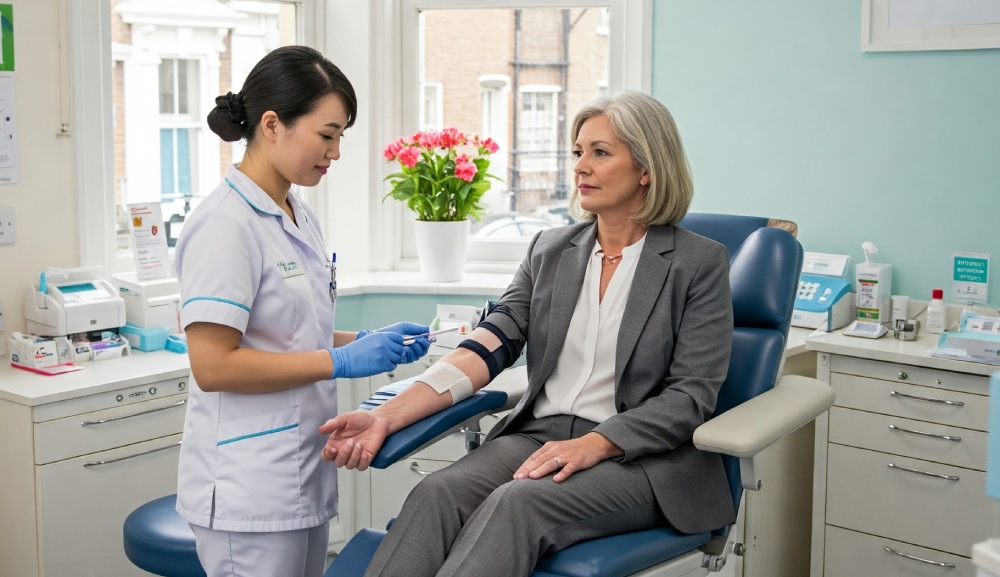When people book a private full body health MOT, one of the most common questions they have is: “What do the blood tests actually check for?” It’s a good question – after all, your blood can reveal a lot about your overall health. We’ll break down what you can expect from blood tests during a private health check, depending on the type of package you choose.
We’ll keep things simple, clear, and easy to understand. Whether you’re just curious, planning to book a check-up, or trying to stay ahead of your health, this guide is for you.
Why Are Blood Tests Important in a Health MOT?
Blood tests are one of the easiest ways to check what’s happening inside your body. They can:
- Spot early signs of health problems, even before you feel unwell
- Help doctors understand how your organs (like your liver and kidneys) are working
- Check if you have any vitamin or hormone imbalances
- Pick up risks for serious conditions like heart disease, diabetes, or even some cancers
A quick blood test can give you a big picture view of your health. That’s why they’re a part of most health MOTs and check ups, even the most basic and lowest cost packages.
What Do Basic Health Screen Blood Tests Usually Check?
If you choose a basic or entry-level health screen, here are the most common blood tests you’ll get:
- Full Blood Count (FBC): Looks at your red and white blood cells. It can spot infections, anaemia (low iron), or signs of inflammation in the body.
- Liver Function Test: Checks if your liver is healthy or under stress. This matters because your liver helps process food, drink, and medicines.
- Kidney Function Test: Shows how well your kidneys are filtering waste. Healthy kidneys are vital for clearing toxins from your blood.
- Cholesterol Test (Lipid Profile): Measures levels of “good” and “bad” cholesterol. High levels of the bad type can raise your risk of heart disease.
- Blood Glucose (Sugar) Test: Checks your blood sugar levels to spot signs of diabetes or prediabetes.
- Thyroid Test (TSH): Measures a hormone that controls your metabolism. If it’s out of balance, you might feel tired, gain weight, or feel down.
A blood test is often done to check your health, or to find out why you’re having certain symptoms. It involves having a small amount of your blood taken for testing.
What Do More Advanced Health Screen Blood Tests Check?
Mid level or more in depth health MOTs usually include everything above, plus extra tests like:
- Vitamin & Mineral Levels: Checks for low levels of vitamin D, B12, iron, or folate. These are important for energy, bones, and brain function.
- Hormone Checks: Looks at hormones like testosterone, oestrogen, or cortisol (the stress hormone). Imbalances can affect your mood, sleep, and energy.
- HbA1c Test: Shows your average blood sugar levels over the past 2-3 months. It’s a better way to spot prediabetes than just a single blood sugar test.
- Inflammation Markers (like CRP): These can show if there’s ongoing inflammation in your body, which could be linked to things like infection or even heart disease.
- Cancer Markers (only in some packages): Special proteins in your blood that could be linked to certain cancers (like PSA for prostate cancer or CA125 for ovarian cancer). These are not always included and aren’t used to diagnose cancer on their own – just as early warning signs.
What Do Premium Health Screen Blood Tests Include?
If you book a top level advanced or “executive” health check, the blood tests can go even further, looking into more detailed parts of your health:
- Advanced Hormone Profiles: A full look at many hormones related to ageing, fertility, energy, and mood.
- Heart-Specific Markers: Tests like troponin or BNP that can show early signs of heart strain or damage.
- Genetic Risk Markers: Some packages check for inherited risks, like a higher chance of developing diabetes or certain cancers.
- Autoimmune Screening: Looks for signs that your immune system is attacking your body (seen in conditions like lupus or rheumatoid arthritis).
- Full Nutritional Panel: Tests for a wide range of vitamins, minerals, and amino acids.
How Do I Know Which Blood Tests I Need?
You don’t need every test available. The right ones for you depend on:
- Your age
- Your medical and family history
- Any symptoms you’re having
- Your lifestyle (e.g. stress, diet, smoking, fitness)
If you’re unsure, look for a check up that includes a doctor or GP review. They can help explain what the results mean and whether you need any extra tests.
What Happens After the Tests?
After doing blood tests as part of a private health MOT, you’ll usually get:
- A report with your results (often colour-coded to show what’s normal or not)
- A doctor’s review or follow-up call
- Advice on any next steps, like changing your diet, seeing a specialist, or having more tests
The best private health check ups make sure you understand your results and what they mean for your health.
There are lots of good resources online that can help you understand your blood tests results.
About our Content
skreen is not a medical provider and does not diagnose or treat conditions. Our content is informational and should not replace professional medical advice.
We’re serious about being a trusted source of information and sharing only the highest quality, medically reviewed content. You can review our Content & Editorial Policy here.




